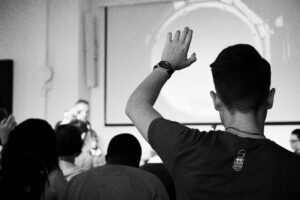What do you do if you’ve scheduled a talk from Israeli and Palestinian speakers at your school on 10th October 2023, three days after the Hamas attacks?
Well, if you’re the school in this story, you go ahead.
That’s because its teachers had been working with Solutions Not Sides (SNS) – educators on the Israeli-Palestinian conflict – for the past 8 years and so they were well prepared to address the complexity and emotions in the room.
We spoke with Sharon Booth, Director and Founder of SNS and Nadia, an RE teacher from the school, to find out more about their partnership and how it’s impacted students and staff.
“Yes, we need to do this.”
Nadia asked us not to use her real name or the name of the school, but we can tell you that it’s a large comprehensive with a broad catchment that covers rural and inner city areas with middle class and working class students.
About 45% of students are of Pakistani heritage and are Muslim, with most of the rest being from White backgrounds. There’s also a small number of students with Bengali heritage, some Ukrainian refugees and a handful of students who are Jewish.
After the Hamas attack on Saturday 7th October, Sharon had to decide whether or not to cancel the events planned at schools the following week.
“My gut instinct was ‘yes, we need to do this’,” she said. “I spoke to some of our partner organisations in the area and to teachers as well and we decided to go ahead.”
So how did SNS and the school build enough trust to go forward at such a tense moment?
Your voice matters
SNS first came onto Nadia’s radar about eight years ago when she heard Sharon speak at an event. “I was like, ‘yes, give me their number right now’,” she said.
Since then, they’ve developed a partnership which includes Sharon bringing Israeli and Palestinian speakers to the school once a year.
“Sharon knows how to speak and communicate with teenagers and I don’t think that all organisations do that,” said Nadia.
“Kids are very honest, they say what they think. They know who cares and who doesn’t, and who’s got an agenda. With SNS they see two young speakers in front of them who have gone through a lot and just want peace and to get along with each other.”
In the early days, students were selected to take part who were studying history or philosophy and ethics at A-Level, but this has now widened to students from other year groups.
“At the beginning I had a lot of resistance from students, and not due to any anti-Israel or anti-Palestinian sentiment, it was ‘it’s not on my exam specification so why am I being made to miss my lesson?’,” said Nadia.
However as the partnership has matured, student involvement has increased, with some going onto take part in the SNS young leader scheme or take part in further activities like Model UN.
Nadia credits this to the approach SNS takes with young people when discussing contentious issues.
“I think what gets students’ backs up is when they feel they can’t express themselves,” she said. “Sharon sets her ground rules but still provides a safe space for students to say how they feel. As an educator I say ‘your voice matters, but how you express it matters too’.”
Sharon is clear that to create a safe and brave space, SNS has to be vocal about its values.
“We let students know that we stand for non-violence, equality and a rejection of hatred,” she said.
“Young people know they’re not going to hear anyone advocating for killing people on either side or elevating the human rights of one side above another or spouting hatred towards anybody.”
Empowering students
Before students meet the guest speakers, they take part in a pre-session where they watch a video with information about the history of the conflict. They’re then invited to complete a booklet which asks them questions about their views, including what they think about the causes of the conflict, and what they think they do and don’t know about the situation.
As Nadia says: “SNS allows students to be assertive in their views but also asks them to listen to other perspectives.”
SNS intentionally tries to bring in speakers who are reasonably close to the age of the students, usually people in their 20s or early 30s.
Sharon says that this increases students’ understanding of the challenge ahead: “At some point everybody twigs that the previous generation of political leaders has failed, and the students start to say, ‘well it’s our turn now, what are we going to do?’,” she said.
“One of our speakers says ‘a conflict we pass to our children is a conflict we lost’. You can see a shift in the session when he says this. It builds trust when students feel respected and listened to, it empowers them to take it forward for themselves.”
Sharon says that it’s rare that students will say something offensive to their speakers, but on occasions when it happens, they’ve trained them to respond in a particular way.
“If the student has said something anti-Israeli or antisemitic, the Palestinian speaker will address it, and if they say something anti-Palestinian or Islamophobic, the Israeli speaker will do the same,” she said. “This means that students who might expect a bit of confrontation with a speaker actually get the opposite.”
“The school is the unit of transformation”
Beyond the speaker sessions, SNS has been working with Nadia’s school and others to build what Sharon calls a ‘culture of empathy’.
“Ultimately, the school itself is the unit of transformation, not just individual students who participate in a session,” she said.
“We want to help schools build a culture of ‘this is how we handle this issue’ and so we came up with the Olive Branch Award to create a lasting partnership between us and the school.”
Schools are invited to sign up for the award for a minimum of three years and during that time, complete activities to acquire ‘leaves’ for their branch. They are awarded leaves for things like having speakers visit them, for teacher training sessions, for enrolling students on SNS’s youth leadership programme and for creating peace murals – an idea they got from Nadia’s school.
Nadia says involvement with SNS has given students a new perspective.
“SNS provides something that students are not seeing,” she said. “They’re not seeing Palestinians and Israelis who want peace in the media. Polarisation is all we are seeing.”
“They see how the conflict impacts the day to day lives of people who have hopes and dreams just like they do.”
While Sharon is confident that the programme is having a lasting impact on students and their schools.
“We ask young people to complete feedback forms. It’s clear that first and foremost they see our speakers as human beings, they’re also embracing the complexity of the situation, and they’re feeling empowered because so many tell us they want to go on and do something about it.”
“A constant reminder that peace in the desired outcome”
So how did it come to pass that the speaker sessions went ahead on 10th October?
Sharon explains: “Our Palestinian speaker landed at Heathrow in the early hours of Saturday morning. When I picked her up, she was in shock. And then I got a call from our Israeli speaker saying her flight from Tel Aviv had been cancelled and she really didn’t want to leave her family at that point.”
In the end, it was decided that the Palestinian speaker would come into school and the Israeli speaker would try to join over Zoom.
“It was difficult,” said Sharon. “Our speaker in Israel told us that if a siren goes off she’d have to go and that there were bombs going off behind her, and our Palestinian speaker was very anxious about the imminent ground invasion in Gaza and how it would affect her friends there.”
We asked Sharon why the speakers decided to go ahead at such a tense and dangerous moment.
“They both felt there was little they could do back home,” she said. “The media is never interested in their work at such a time, but this gave them a platform to continue working for longer-term change, which was empowering for them.”
“They also really support our mission to ensure that we don’t import dehumanisation and hate into our UK society from this conflict.”
Nadia says the speakers’ determination to continue had a huge impact on the students who attended. She asked them to describe how they felt about that day.
One said: “The mood in the room was incredibly sombre and quite emotional as it was clear that even once the session finished for us, the speakers would be affected permanently by the conflict. Their experiences won’t be forgotten by us.”
Another shared: “We all gained raw, truthful knowledge that covered in depth how horrific the conflict really is, yet there was the constant reminder that peace is the desired outcome and to achieve this, all sides of the conflict need to come together.”
‘It was inspiring, the empathy and power the two women had despite the circumstance and their fight for peace definitely urged me to want the same.”
What you can do
We asked Nadia for her advice on how to host organisations like SNS in schools:
Get support from across the school. “My headteacher is fantastic but I have help from other colleagues too – there’s the site team, the head of sixth form, the deputy headteacher, assistant headteacher and the headteacher’s personal assistant too. I couldn’t do this on my own.”
Prepare well for the session. “Make sure the room is set up for the SNS team. Make sure you’ve got copies of any resources you need. Have people at the door so that the session isn’t disturbed.”
Get the numbers right. “An ideal number of students is about 30 because it allows them to have the confidence to put their hands up and speak. We also allow students to write their questions anonymously on notes that we then read for them.”
We also asked Sharon for advice on how to address antisemitic or Islamophobic hate speech with young people:
Take a breath. “If somebody says something offensive, give yourself a second because your emotions immediately leap up when you hear it.”
Name the emotion in the room. “Say: ‘I know you may not have intended it, and you’re not in trouble, but some people in this group may feel that hurt by what you said’.”
State a need. “Say: ‘It’s important that we talk freely about the subject but that we need to find a way to do it that doesn’t hurt one another because we all care about each other’.”
Make a request. “Say: ‘I’d like you to explain more about what you meant by that, and I’d like to talk about what others might have understood when you said that, so we can all understand each other properly. We can all say what we want to say but we can do it in a way that doesn’t hurt people’.”
You can find out more about SNS here. And you can download its guide to addressing hate speech in schools here.


